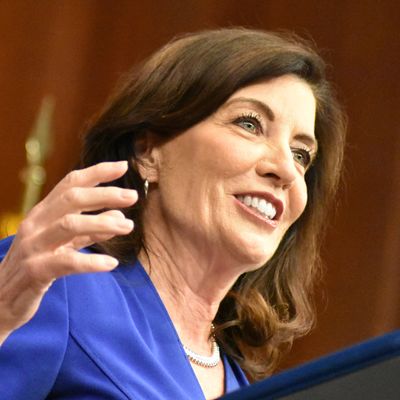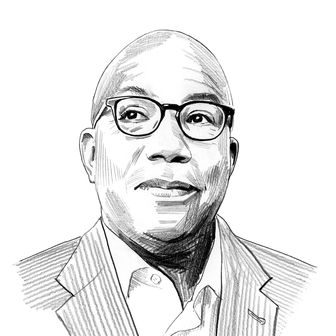
The unexpectedly close contest between Governor Kathy Hochul and Representative Lee Zeldin for the top job in state government has been dominated by national issues — inflation, rising crime, abortion rights, climate change — rather than bread-and-butter matters like schools, tax rates, and transportation policy. The race for governor will settle the question of whether New York voters want a minor course correction or a major overhaul in Albany — and will also determine the outcome of important local questions that have received little attention.
In general, Hochul is running on the premise that we already have effective strategies to address the state’s most pressing problems — a weakening economy, rising crime, the housing shortage, and the effects of climate change — and that she is the right leader to prioritize and execute those plans. “Every single day I wake up thinking about how I can fight harder for you and your families,” she said at the opening of the sole debate between the candidates.
Her challenger, Republican Lee Zeldin, has argued, in every public speech of the campaign, that giving Democrats full control of the Statehouse isn’t working for New York, making it necessary to end the one-party rule that has placed control of all statewide offices, the legislature, and the mayoralty of the state’s five largest cities all in the hands of Democrats.
“New York is in crisis,” he said at the debate. “You’re poorer and less safe because of Kathy Hochul and extreme policies. This is your opportunity to save New York.”
Hochul claims that Zeldin’s constant emphasis on rising crime in New York City — and his vow to declare a statewide emergency and suspend bail reform and other laws upon taking office — is about the politics of panic rather than policy. “You can either work on keeping people scared or you can focus on keeping them safe,” she said at the debate. “I have worked hard to have real policies that are making a difference,” citing the decline in murders and shootings in New York City since she took office.
Zeldin’s strategy of showing up at crime scenes to decry bail reform and other policies has paid off for him politically: Hochul has taken to promoting her own crimefighting bona fides in recent days, pointing out at every turn that she supports limits on gun ownership that Zeldin has consistently opposed.
Here’s where the candidates stand on other issues.
Affordable Housing
With more than more than 150,000 eviction filings this year alone and rents hitting record high levels in Manhattan, affordable housing is at the top of the list of concerns for New Yorkers. The difference here between candidates is stark.
“Gov. Kathy Hochul, a Democrat, has a housing plan. Zeldin does not,” is how City Limits, the housing-focused nonprofit new organization, succinctly put it. Indeed, when asked about affordable housing during the debate, Zeldin said: “While we need to be building more affordable housing, and there are individuals and companies that want to invest here, but because it takes so long for them to be able to get approvals, the process is so drawn out that they’re looking to other states and they’re sending their money elsewhere.”
Hochul, by contrast, has announced a five-year, $25 billion plan that she says will create or preserve 100,000 units of lower-cost, with 10,000 of the units dedicated to supportive housing for elderly or medically vulnerable populations.
Congestion Pricing
The long-awaited plan to impose a charge on vehicles in the most congested parts of Manhattan below 60th Street is intended to reduce the number of vehicles clogging the streets; lower the level of air pollution; and raise more than $1 billion for improvements to mass transit. Hochul supports the plan, although she has cautioned that “this is not going to happen over the next year, under any circumstances” due to delays imposed by the federal government.
By contrast, “I’m totally opposed to congestion pricing,” says Zeldin, calling it “the latest way Albany is looking to raid what’s left in your wallet.” It’s easy enough to reduce the different positions to politics: Hochul, endorsed by the League of Conservation Voters, is appealing to the environmentalists who support congestion pricing, while Zeldin’s base of support in the Long Island suburbs are car owners who hate the idea of paying an extra toll to drive into the city.
Education
Governor Hochul’s campaign website is surprisingly skimpy on education, and while she has vowed to put more money into schools, she has not highlighted particular K-12 policies on the campaign trail. Zeldin, like other conservative candidates around the country, has attacked critical race theory and called for restrictions on “age-inappropriate” sex education.
Zeldin has also pushed back hard against calls to require all Hasidic yeshivas to provide an adequate education in non-religious subjects, and has picked up the organized support of some Jewish leaders in Borough Park and elsewhere. Hochul, has largely ducked the question by pointing out that regulation of private schools is controlled by the state Board of Regents, not the governor. Politically, she has made alliances with some Hasidic leaders to blunt Zeldin’s surge of support.
On another hot-button education question, Hochul and Zeldin both support an expansion of charter schools.
Economic Growth and Taxes
Zeldin is an unabashed supporter of hydro-fracking in upstate New York, while Hochul supports the ban on fracking implemented administratively by her predecessor, Andrew Cuomo, in 2015 and passed into law by the legislature in 2020. “I don’t think that the government should be in charge of setting those parameters,” Zeldin said at the debate. “We need to approve new pipeline applications, and do a better job delivering energy across the entire state.”
As an ally of President Biden, Hochul has touted the federal investments that will subsidize the manufacture of computer chips upstate. “Ask Micron why they came to New York with 50,000 jobs, because we know how to do that,” she said at the debate.
Both candidates have pledged to cut taxes, with the Republican making the most extravagant promises. “One of the key things that we need to do is cut taxes across the board,” Zeldin told the state Business Council this fall. “That includes getting rid of the estate tax in New York. I, personally, am somebody who would be all in favor of there not even being an income tax in New York.”
At the debate, Hochul touted her own tax-cutting bona fides. “If you’re really serious about helping people, you cut their taxes on middle-class families. I did that this year with the legislature,” she said. “We gave people property-tax rebates this year. We suspended the state tax on gasoline to help get more money back in their pockets.”































